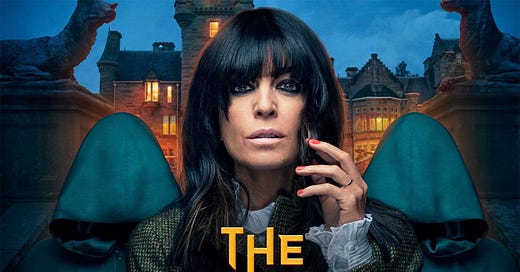Admittedly, I’m not a big fan of reality TV, and I am usually pretty loathe to watch any shows in that realm. I couldn’t quite tell you what my initial aversion was pre-qualifying as a psychologist (probably that I found people/contestants in those shows a bit annoying and had - and still do have - a preference for storytelling in films and TV shows). But since becoming a psychologist, it’s more that I dislike these shows because I think they can be purposefully manipulated for “entertainment value” and can be unhelpful (and harmful) to both the show’s participants and the viewers (here I’m thinking of the likes of Love Island) or there’s a reliance on “psychology” (like Married at First Sight - at least I think that’s the one where they use psychologists to match the contestants).
I felt this way when the UK version of The Traitors came out last year. I can’t quite remember what got me watching it; it might have been the general hype and a request from my partner to check it out. But I was hooked from the start and have enjoyed it ever since. If you don’t know what The Traitors is, it’s a game show where 22 people travel to a Scottish castle, working together to compete in challenges for money, building up a pot of winnings to share amongst themselves at the end. They’re all considered “Faithfuls”. However, among the Faithfuls are the “Traitors”, whose job is to “murder” the Faithfuls every night, while the Faithfuls must, in kind, figure out who the Traitors are and banish them at daily round-table discussions. The Faithfuls aim to banish all the Traitors by the end of the game; otherwise, they lose all the accumulated winnings to the remaining Traitors.
One of my favourite things about the show, however, is the fact that everyone suddenly becomes the fucking Benedict Cumberbatch version of Sherlock Holmes: intuitive and able to read and infer motives and detect deception via body language and observed behaviour. However, all the Faithfuls in the show are appalling because, most times, they end up banishing their own instead of a Traitor (unless the Traitors somehow manage to coordinate a back-stabbing of their own). I love it when a contestant professes to be able to “read people”, and I’m like “You can’t!!!”
I’m not saying people can’t come across as suspicious or that their actions might not always match their words. But it’s not always because they’re lying. More importantly, as observers of that behaviour, we can’t always be correct in our assessment of why that shifty, suspicious, or incongruent behaviour occurs, at least not with the confidence level the Faithfuls claim to be able to detect the liars among them. Equally, I know that some people make a living on reading the behaviour of others (I believe they’re called behavioural analysts). I’m not saying they aren’t good at what they do, but I will say they likely have much more experience in “reading” people than your average UK citizen applying to and participating in a televised game show. If you want to read an interesting book about how bad we humans are at reading each other, Malcolm Gladwell’s Talking to Strangers is pretty good.
The other thing I also enjoy is how much those selected as Traitors get into the role and how some are much better at being a Traitor than others. Don’t get me wrong; I’m a big believer that humans are inherently good and will generally do good things. At the same time, I think games like The Traitors allow its participants - within the safe confines of a game that has specific parameters of what is and isn’t allowed within the rules of the game - to be playfully devious, treacherous, and ultimately traitorous. It also enables viewers to support and cheer the Traitors on and perhaps celebrate when the Faithfuls get it wrong and banish one of their own. It’s just fun.
Aside from the fun, I also found these two pieces of knowledge on the good ol’ ’Gram about the origin of the gameshow’s basic premise (spoiler alert, this is where the reference to werewolves comes in….)
I bet you feel smugly more knowledgeable about The Traitors now, don’t you? You’re welcome.
The final thing I enjoy about The Traitors - and I must admit, this is a big part of the show’s appeal - is the music. The show seems to use a lot of orchestral covers of songs, as in quite unnecessarily dramatic epic covers of the song, and I fucking love it. To give you an idea of what I mean, I have put several of my favourites from both seasons 1 and 2 of the show below for you to listen to. I will leave you to enjoy them as an end to this blog post (if you click the links below, it will take you to Spotify to listen to each song individually).
What about you? Do you enjoy The Traitors? If so, what aspects do you like? And, better yet (because we don’t always have to agree on things), if you aren’t a fan, what is it that you dislike about the show (even if you haven’t watched it… I am here for hearty prejudice of reality TV).
Enjoy the music, and as always, all the best.
Nice-ish.






